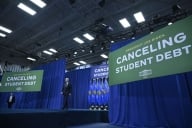You have /5 articles left.
Sign up for a free account or log in.
The Young America’s Foundation, a national conservative student group, wants all students to be eligible for a 35-year-old federal scholarship program that helps underrepresented students attain doctoral degrees.
The $60 million Ronald E. McNair Post-Baccalaureate Achievement Program, which started in 1989, was designed to help first-generation and low-income students, as well as those from underrepresented groups, including Black or Hispanic students. Students must have at least a 2.8 GPA in order to be eligible, among other criteria. The federal government sets the eligibility criteria for McNair Scholars.
In a lawsuit filed this week, lawyers representing YAF as well as two white students at the University of North Dakota and the University of Wisconsin at Madison argued that the eligibility criteria are unconstitutional, based on the Supreme Court decision to strike down the use of race-based policies in admissions decisions. The student plaintiffs were interested in the McNair program but ineligible.
“Denying a student the chance to compete for a scholarship based on their skin color is not only discriminatory but also demeaning and unconstitutional,” YAF president Scott Walker said in a statement.
Conservative legal groups and lawmakers have argued that the Supreme Court decision extends to race-based scholarships and other programs, a push that’s led some universities to remove racial criteria from scholarships.
The McNair program is part of a suite of programs known as TRIO, which are designed to identify and support students from disadvantaged backgrounds, helping them get to and through college. Universities receive funding to operate a McNair program on their campuses for both undergraduate and graduate students. The goal is to increase “the attainment of [doctoral] degrees by students from underrepresented segments of society,” according to the Education Department.
The department funded programs at 216 colleges and universities this past academic year, the lawsuit states, benefiting about 6,000 students.








